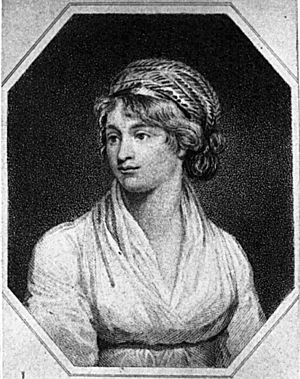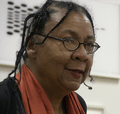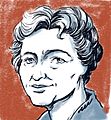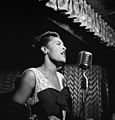Feminism facts for kids
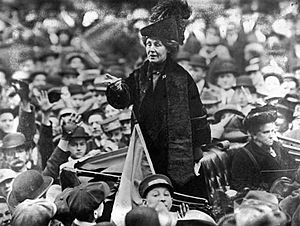
Feminism is a social and political movement. It's all about changing how people view the rights of males and females. Feminists work to make sure everyone has equal rights, no matter their gender. Someone who supports feminism is called a feminist.
There are different ways people think about feminism:
- Some feminists believe all genders should be treated exactly the same. They think a person's gender shouldn't matter. These feminists often believe that traditional ideas, like women staying at home to care for children, are unfair. They think men and women should share these jobs equally.
- Other feminists believe there are important differences between men and women. However, they still believe these differences should not lead to unfair treatment of women. For example, they might say some women want to stay home with children. But they should not be forced to do this. Also, they should be paid for this important work, either by a partner or the government.
There are many other types of feminism too.
Contents
What is the history of feminism?
Early ideas about women's rights
Feminism began with the idea that human rights should also apply to women. Important thinkers in the 18th and 19th centuries shared this idea. People like Mary Wollstonecraft and John Stuart Mill were among them.
Later, in the early 20th century, feminists fought for women to be allowed to vote in a democracy. Many women felt very strongly about this. They held many protests. These women were called Suffragettes. They were fighting for Universal suffrage, which means everyone can vote. The Suffragettes organized many protests for their rights.
After women gained the right to vote, feminism continued to work for equality in all parts of society.
Women in leadership roles
Throughout history, women have been involved in politics.
Women in power long ago
Some famous women in history who held power include Esther, Lady Godiva, Queen Elizabeth I, Catherine the Great, and Joan of Arc.
Women leaders in modern times
Since 1960, many women have been elected to high positions. Some have become prime minister. Sirimavo Bandaranaike was the first. Others include Indira Gandhi, Golda Meir, Elisabeth Domitien, and Margaret Thatcher. Dame Eugenia Charles served for almost 15 years, which is a record.
Not all female politicians have been supported by feminists. Some examples include Margaret Thatcher, Sarah Palin, and Michele Bachmann.
Why do some people criticize feminism?
Some people have reasons why they do not agree with feminism:
- Some believe women are already equal or even have more rights in the law. These critics often say that society is not equal for men either. They might point to areas like child custody and divorce laws.
- Some say that feminism wants women to be more important than men.
- Others argue that women and men have natural biological differences. Because of these, they believe men and women cannot be treated in exactly the same way. For example, they might mention the role of women in the military or that only women can experience pregnancy.
- Some people do not like feminism because it wants to change society. They worry it could lead to men having less power.
- There is a concern that feminism could give women special rights. These rights might then harm other groups and their rights. For instance, some fear women might take jobs usually done by men.
- Some religious people believe feminism goes against what God intended. For example, in Genesis chapter 2, it says God made Eve (the first woman) as a companion for Adam (the first man). Some interpret this to mean women were made to serve men. However, others believe God created men and women to be equal (see Ephesians 5:21). This difference in belief leads to different views among Christian and Jewish denominations about whether women can be official leaders in a church. See also Women in Islam.
Images for kids
-
Feminist, author and social activist bell hooks (b. 1952)
-
2017 Women's March, Washington, D.C.
-
Elizabeth Cady Stanton, a major figure in 19th-century liberal feminism
-
Eva Kolstad, a major figure in the development of postwar liberal state feminism in the Nordic countries
-
Emma Goldman a union activist, labour organizer and feminist anarchist
-
Octavia Butler, award-winning feminist science fiction author
-
American jazz singer and songwriter Billie Holiday in New York City in 1947
-
Cmdr. Adrienne Simmons speaking at the 2008 ceremony for the only women's mosque in Khost City, a symbol of progress for growing women's rights in the Pashtun belt
-
Charlotte Perkins Gilman wrote about feminism for the Atlanta Constitution, 10 December 1916.
-
After selling her home, Emmeline Pankhurst, pictured in New York City in 1913, travelled constantly, giving speeches throughout Britain and the United States.
-
Louise Weiss along with other Parisian suffragettes in 1935. The newspaper headline reads "The Frenchwoman Must Vote".
See also
 In Spanish: Feminismo para niños
In Spanish: Feminismo para niños


